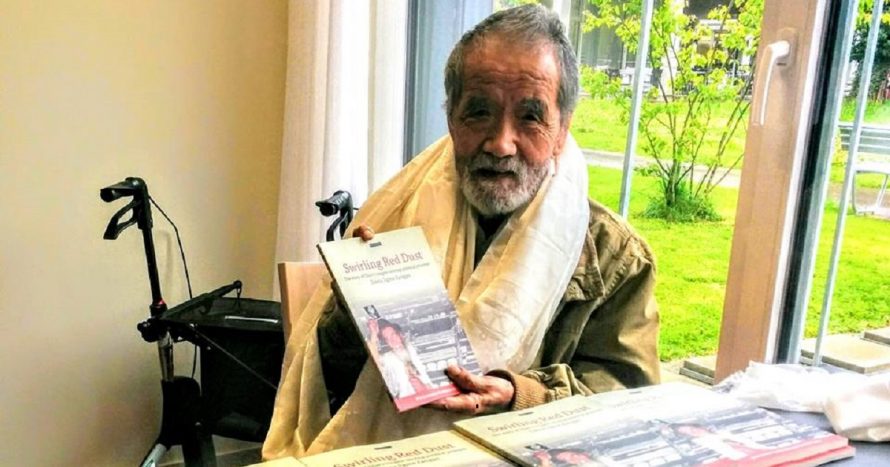Takna Jigme Sangpo, who had been Tibet’s longest serving political prisoner, passed away in Switzerland on October 17, 2020.
In 2002, the Chinese government released Sangpo on medical parole as a result of international pressure while he was serving his most recent sentence of 28 years on charges of “counterrevolutionary propaganda and incitement.” Sangpo left prison nine years before the end of his sentence. Prior to that, he had received prison sentences in 1964 and 1970.
The Swiss government and the United States had taken an active interest in Sangpo’s case. In addition to the US State Department, the late Congressman Tom Lantos was among those who took the lead on Sangpo’s behalf. Subsequently, Sangpo was permitted to travel to the United States for medical treatment and arrived in Washington, DC on July 13, 2002. The International Campaign for Tibet coordinated his stay and initial medical examination and treatment here.

Beginning a life of freedom
On July 29, 2002, Sangpo issued a public statement in which he credited his release to the many years of campaigning and pressure by Tibet supporters, governments, individuals and public organizations in the international community, within and outside Tibet.
“Above all, it is the fruit of international support for the fulfillment of the aspirations of His Holiness the Dalai Lama. I would like to express my heartfelt gratitude to everyone,” he said.
“Most importantly, as I begin to enjoy a life of freedom and happiness, I am concerned at the fate of my former fellow prisoners who continue to suffer and languish in dark prisons. Therefore, I take this opportunity to urge strongly for the immediate release of all Tibetan political prisoners,” the statement added.
“Above all, I urge for your continued support for the Tibetan issue until there is a solution to our just cause,” Sangpo concluded in his statement. After initial treatment in the United States, he opted to go to Switzerland in August 2002, as he had a standing invitation from the Swiss government to undergo medical treatment there. Initially, he was housed in the Tibet-Institut Rikon and eventually moved to a retirement home where he passed away.
In October 2002, Sangpo traveled to Graz in Austria where he received an audience with the Dalai Lama.
Many arrests
Born in 1926, Takna Jigme Sangpo was first arrested in 1960 while teaching at Lhasa Primary School and charged with ‘corrupting the minds of children with reactionary ideas.’
In 1964 he was sentenced to three years’ imprisonment in Sangyip Prison over comments regarding Chinese repression of Tibetans and was sent to a labor camp in Lhasa, Tibet’s capital.
In 1970 he was sentenced to 10 years hard labor in Sangyip Prison on charges of inciting his niece to escape to India to report Chinese atrocities to the Dalai Lama.
Sangpo was released from prison in 1979 and transferred to Reform-Through-Labor Unit 1 in Nyethang, west of Lhasa, but he was arrested again on Sept. 3, 1983 by the Lhasa City Public Security Bureau.
In the official sentencing, issued on Nov. 30, 1983, the Lhasa City Intermediate People’s Court noted that the defendant had evidently never seriously re-considered his past “counter-revolutionary crimes.” He was therefore charged with “spreading and inciting counter-revolutionary propaganda” and sentenced to 15 years’ imprisonment in addition to five years’ deprivation of civil and political rights.
On Dec. 1, 1988, Sangpo was again prosecuted for raising “reactionary slogans” relating to Chinese suppression of Tibet while in Drapchi prison (also called the “Tibet Autonomous Region” Prison). He was once again found guilty of “spreading and inciting counter-revolutionary propaganda,” and his sentence was increased by five years, and the deprivation of his civil and political rights was extended by another year.
On April 4, 1992, Sangpo received an additional eight-year sentence extension and a subsequent three-year extension on the deprivation of his civil and political rights. This brought his current sentence to a total of 28 years.
Had his sentence been carried to term to September 2011, Sangpo would have spent 41 years in prison.
Indomitable spirit
He represents the indomitable spirit of the Tibetan people and was a reminder to the international community about the aspirations and determination of the Tibetan people under Chinese rule.
In 2017, the International Campaign for Tibet supported the English publication of Sangpo’s memoir, “Swirling Red Dust, the story of Tibet’s longest-serving political prisoner.” Those desiring a copy can contact support@tibetwrites.in.